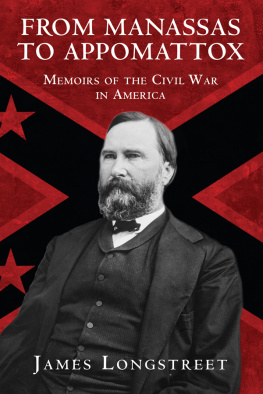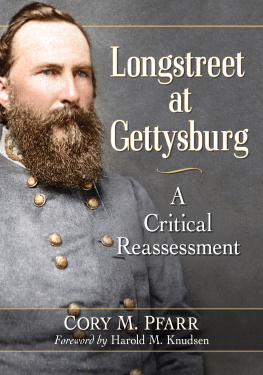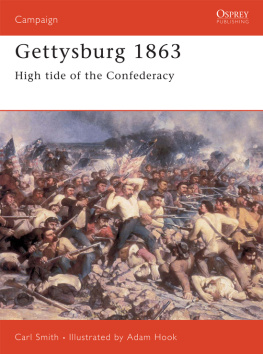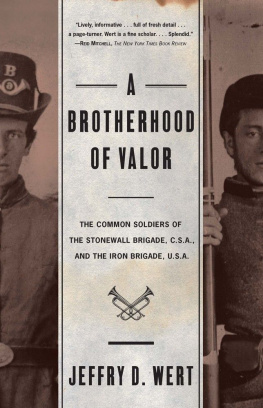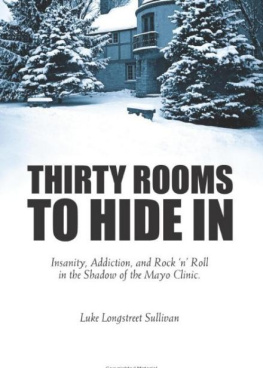PREFACE
Table of Contents
This brief story of a gigantic event, and General Longstreets part therein was arranged for publication in book form in the fall of 1903, before his death, which occurred January 2, 1904. It is the carefully sifted story of the records and contemporaneous witnesses, and for clearness I have here and there introduced General Longstreets personal version of some of the disputed points. But the reader will perceive that at last it is the story of the records.
For my undertaking I drew liberally from General Longstreets memoirs of the war, Manassas to Appomattox; from his stores of knowledge in the military art, and his treasure-house of memories of the Titanic encounter on the field of Gettysburg. The war-pictures included herein are also from the above-mentioned volume. And I am gratefully indebted to Captain Leslie J. Perry, formerly of the War Records Office, Washington City, for valuable assistance.
An appendix, added since General Longstreets death, includes a small selection from the thousands of tributes from every quarter of the republic.
One of the last of the brilliant generals of the Civil War, whose valor and skill in the command of great armies, is to-day the common glory of the restored Union, has contributed an introduction. No survivor of the great struggle has a better right to speak of Gettysburg than General Daniel E. Sickles. In this connection the following letter is appreciatively reproduced.
Washington , September 19, 1902.
General D. E. Sickles ,
Gettysburg, Pennsylvania:
My dear General Sickles ,My plan and desire was to meet you at Gettysburg on the interesting ceremony attending the unveiling of the Slocum monument; but to-day I find myself in no condition to keep the promise made you when last we were together. I am quite disabled from a severe hurt in one of my feet, so that I am unable to stand more than a minute or two at a time. Please express my sincere regrets to the noble Army of the Potomac, and accept them, especially, for yourself.
On that field you made your mark that will place you prominently before the world as one of the leading figures of the most important battle of the Civil War. As a Northern veteran once remarked to me, General Sickles can well afford to leave a leg on that field.
I believe it is now conceded that the advanced position at the Peach-Orchard, taken by your corps and under your orders saved that battle-field to the Union cause. It was the sorest and saddest reflection of my life for many years; but, to-day, I can say, with sincerest emotion, that it was and is the best that could have come to us all, North and South; and I hope that the nation, reunited, may always enjoy the honor and glory brought to it by the grand work.
Please offer my kindest salutations to your governor and your fellow-comrades of the Army of the Potomac.
Always yours sincerely,
(Signed) James Longstreet ,
Lieutenant-General Confederate Army.
Early in December advance chapters were given to the press for January 3; by strangely pathetic coincidence that being the date on which public announcement was made of General Longstreets death.
This hour does not clamor for the charity of silence, but for the white light of truth which I reverently undertake to throw upon the deeds of the commander who, from Manassas to Appomattox, was the strong right arm of the Confederate States Army.
I was writing for love of him whose dear name and fame had been attacked; to place before his fading vision enduring appreciation of his valiant deeds as a soldier and high qualities as a gentleman. Providence decreed otherwise. While the opening chapters were running into type, the Great Captain on High called him hence, where he can at last have his wrongs on earth forever righted.
The warrior sleeps serenely to-day, undisturbed by all earthly contentions, the peace of God upon him. And I bring to his tomb this little leaf fragrant with my love, bedewed with my tears, heavy-weighted with my woe and desolation.
H. D. L.
Gainesville, Georgia , August 1, 1904.
INTRODUCTION
By Major-General D. E. Sickles, U.S.A.
Table of Contents
I am glad to write an introduction to a memoir of Lieutenant-General Longstreet.
If it be thought strange that I should write a preface to a memoir of a conspicuous adversary, I reply that the Civil War is only a memory, its asperities are forgotten, both armies were American, old army friendships have been renewed and new army friendships have been formed among the combatants, the truth of history is dear to all of us, and the amenities of chivalrous manhood are cherished alike by the North and the South, when justice to either is involved. Longstreets splendid record as a soldier needs neither apologies nor eulogium. And if I venture, further along in this introduction, to defend him from unfair criticism, it is because my personal knowledge of the battle of July 2, 1863, qualifies me to testify in his behalf. It was the fortune of my corps to meet Longstreet on many great fields. It is now my privilege to offer a tribute to his memory. As Colonel Damas says in The Lady of Lyons, after his duel with Melnotte, Its astonishing how much I like a man after Ive fought with him.
Often adversaries on the field of battle, we became good friends after peace was restored. He supported President Grant and his successors in their wise policy of restoration. Longstreets example was the rainbow of reconciliation that foreshadowed real peace between the North and South. He drew the fire of the irreconcilable South. His statesmanlike forecast blazed the path of progress and prosperity for his people, impoverished by war and discouraged by adversity. He was the first of the illustrious Southern war leaders to accept the result of the great conflict as final. He folded up forever the Confederate flag he had followed with supreme devotion, and thenceforth saluted the Stars and Stripes of the Union with unfaltering homage. He was the trusted servant of the republic in peace, as he had been its relentless foe in war. The friends of the Union became his friends, the enemies of the Union his enemies.
I trust I may be pardoned for relating an incident that reveals the sunny side of Longstreets genial nature. When I visited Georgia, in March, 1892, I was touched by a call from the General, who came from Gainesville to Atlanta to welcome me to his State. On St. Patricks Day we supped together as guests of the Irish Societies of Atlanta, at their banquet. We entered the hall arm in arm, about nine oclock in the evening, and were received by some three hundred gentlemen, with the wildest and loudest rebel yell I had ever heard. When I rose to respond to a toast in honor of the Empire State of the North, Longstreet stood also and leaned with one arm on my shoulder, the better to hear what I had to say, and this was a signal for another outburst. I concluded my remarks by proposing,
Health and long life to my old adversary, Lieutenant-General Longstreet,
assuring the audience that, although the General did not often make speeches, he would sing the Star-Spangled Banner. This was, indeed, a risky promise, as I had never heard the General sing. I was greatly relieved by his exclamation:



